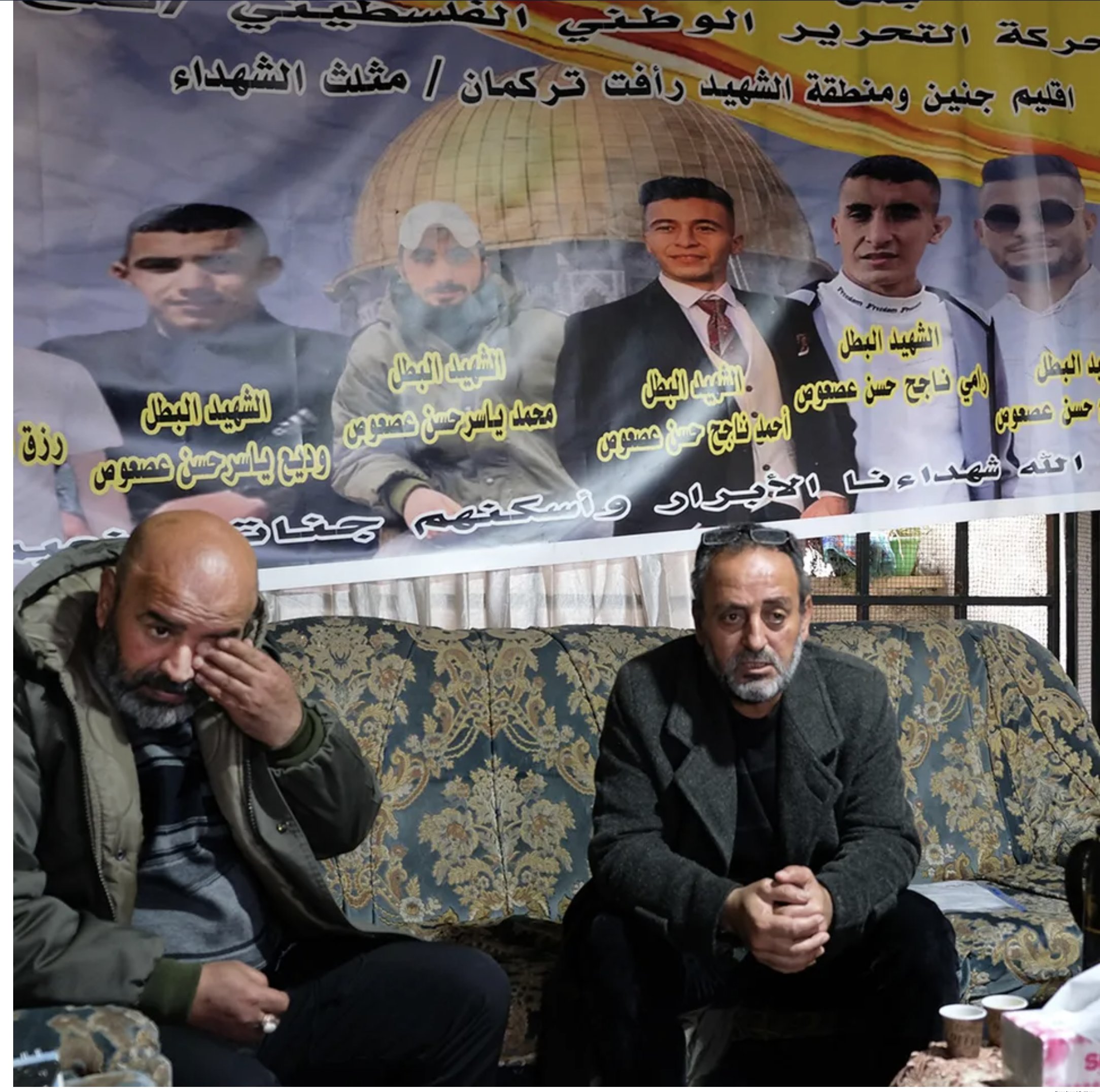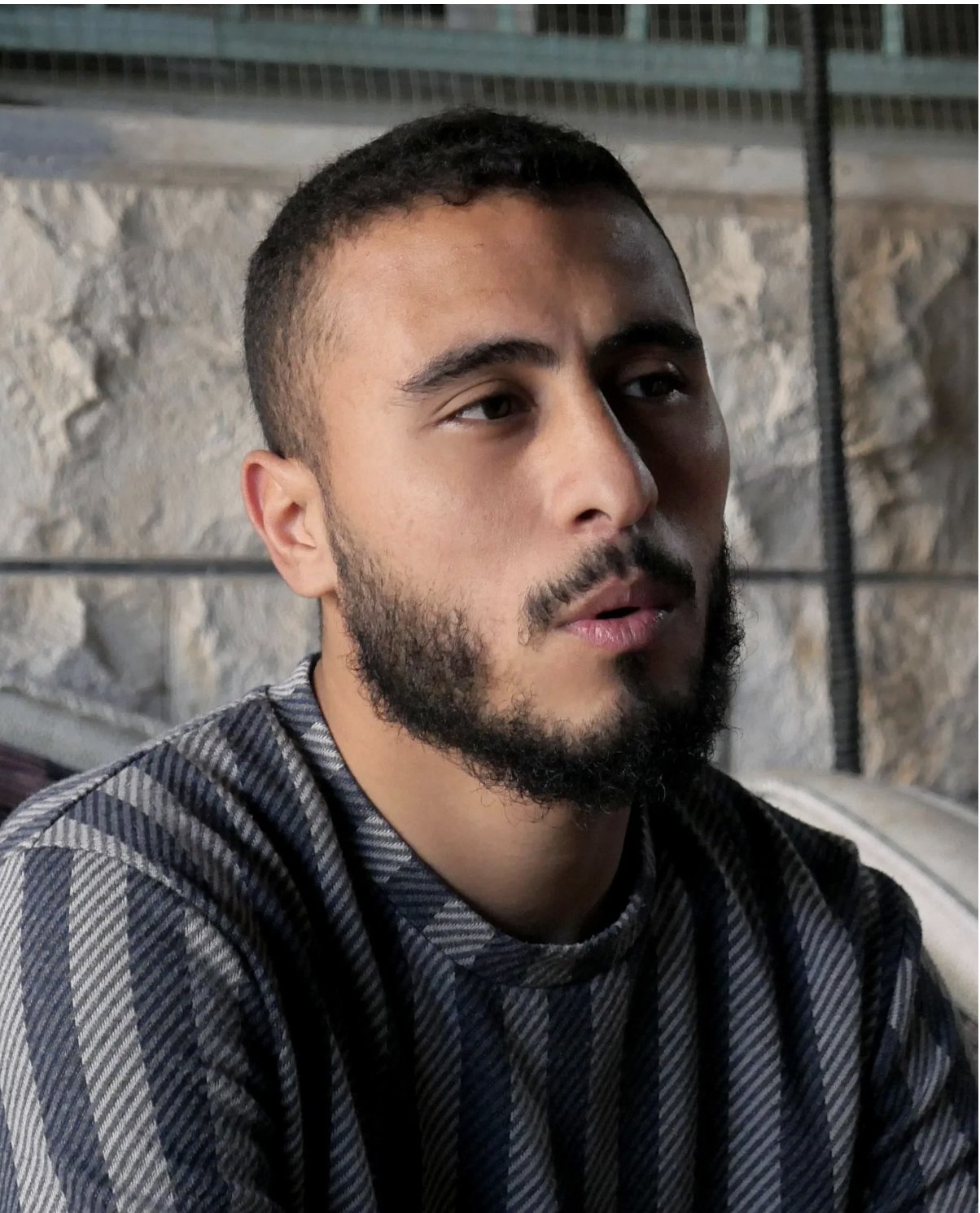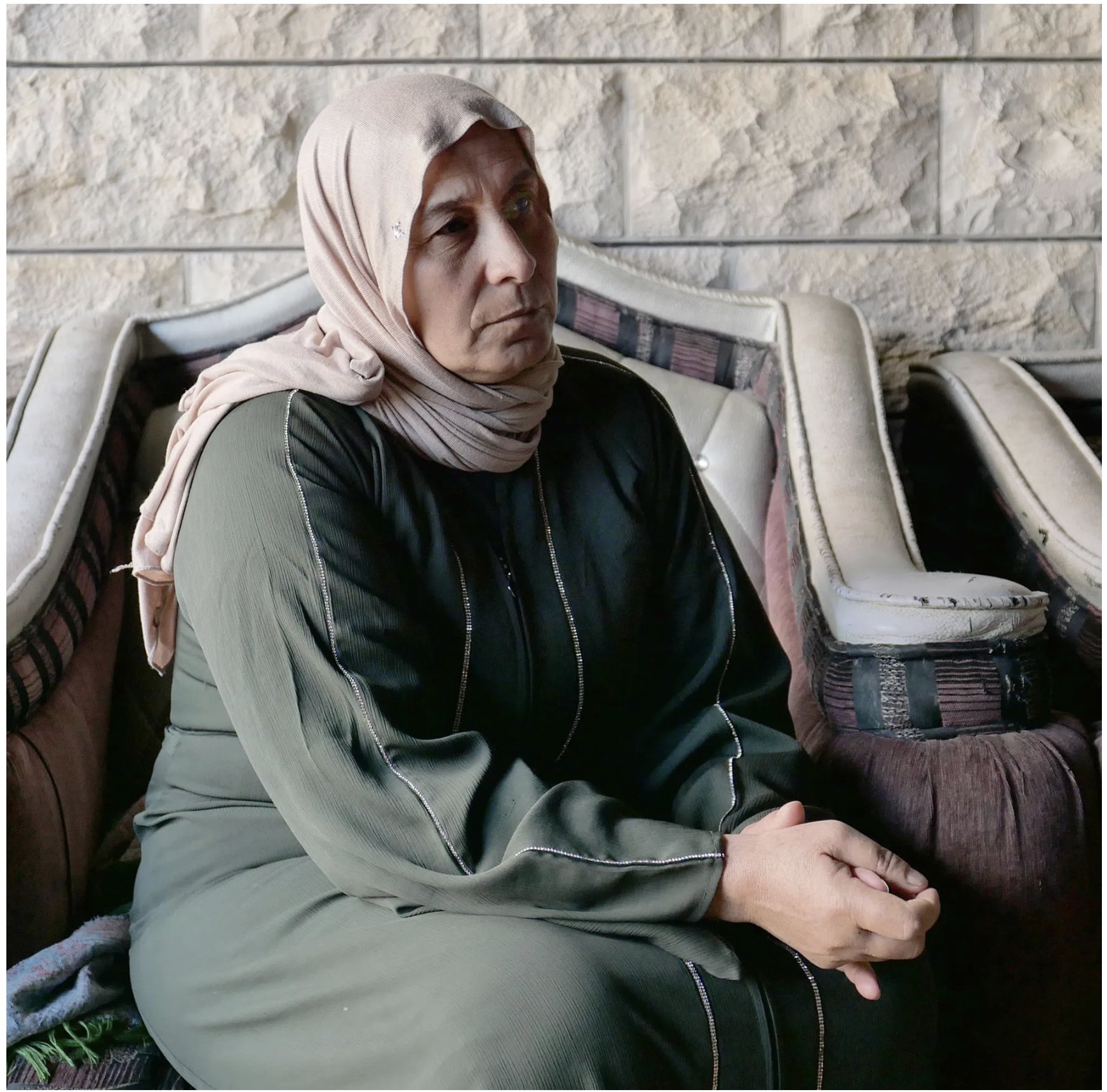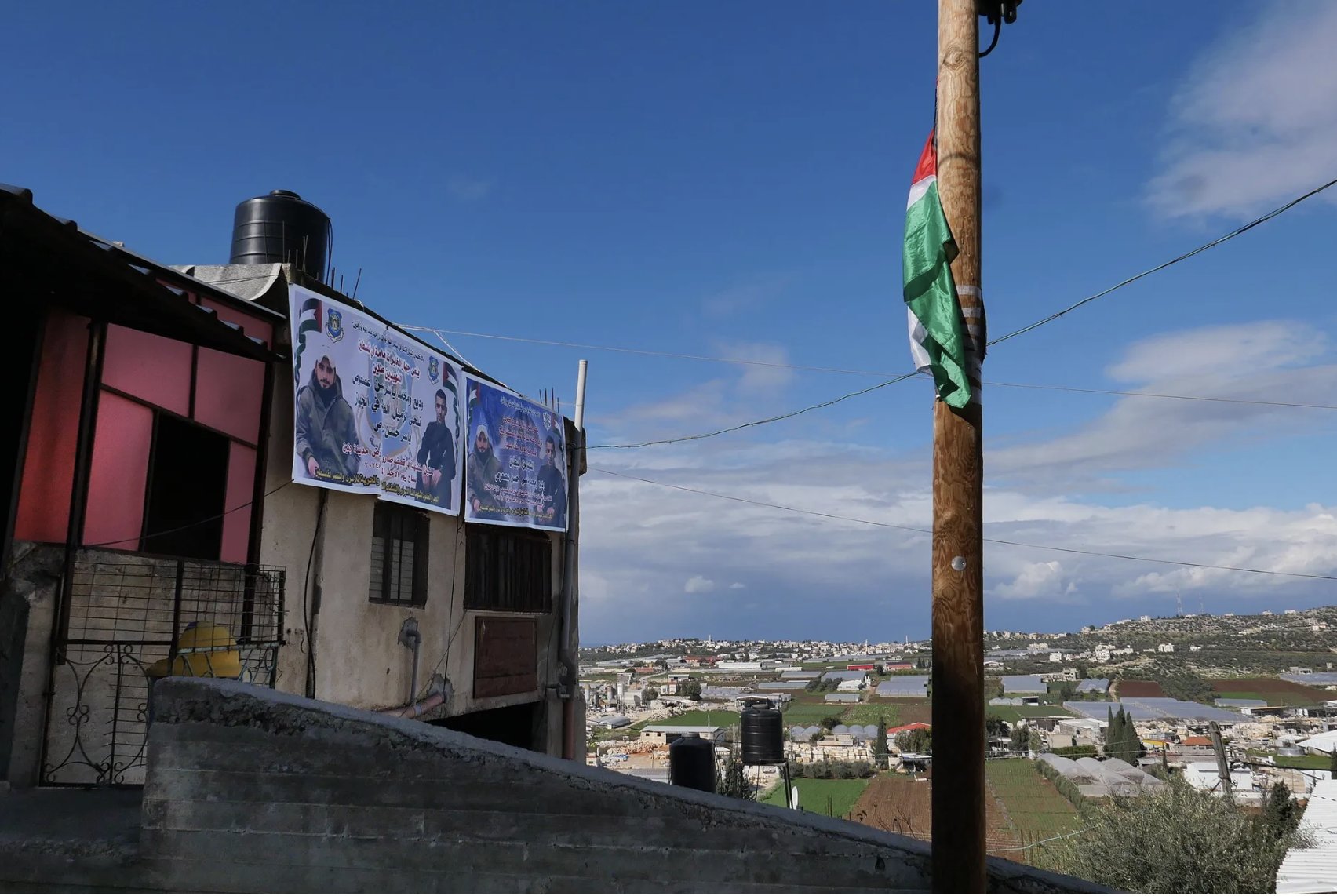
Yasser Asous, left, at home in the village of Muthalath al-Shuhada this week with his relative Mohammed Asous, under the poster memorializing the seven victims of the January 7 attack.Credit: Alex Levac
A father attends his son’s funeral. While standing by the freshly dug grave he receives a message that yet another of his sons is also dead. A short while later he has to bury him, too. In an adjacent plot, a mother is burying her four sons, one after the other. These horrors are no longer the exclusive purview of the war in the Gaza Strip, but also occur in the West Bank, where there is no war.
The fact that four of the seven Palestinians killed in the January 7 incident that resulted in the funerals were brothers, in addition to two others who were also brothers; the fact that all seven were from the same extended family; the fact that one victim was a dialysis patient in an ambulance who was attempting to get to the hospital in Jenin for treatment, although the city was surrounded by Israel Defense Forces troops; the fact that in recent months the IDF has been killing people indiscriminately in the West Bank and not only in the war in Gaza by firing missiles from unmanned aerial vehicles – all of this only intensifies the scale of the disaster that the IDF has inflicted upon the relatively tranquil village of Muthalath al-Shuhada, roughly translated as the “Triangle of the Martyrs.”
Muthalath al-Shuhada is a village of refugees that was established in 1948 adjacent to Qabatiyah junction, not far from the southern entrance to Jenin, near the cemetery where Iraqi soldiers killed in the 1947-1949 war against Israel are buried. At the spot where the seven were killed, fragments of the deadly missile fired at them during an IDF raid on the adjacent Jenin refugee camp can still be seen.
The seven young people were standing on a traffic island in the middle of Highway 60, the busy main road to the city of Jenin. The café on the west side of the highway was destroyed by the resulting blast waves; work is already underway to rebuild it. The pit the missile created in the ground, the pieces of metal scattered every which way, the shards of glass and the bloodstains at the site offer only lame testimony to what happened here as dawn rose on that Sunday.

Mohammed Asous. Could not possibly imagine that three more of his brothers had also been killed.Credit: Alex Levac
In the guest room of the home of Yasser Asous, the father of the two brothers, a huge memorial poster hangs across the whole length of a wall: It depicts seven men who are no longer among the living. From right to left: Ala Asous, 30, in a red shirt; then his brother Hazaa, 26, wearing a white shirt and sunglasses; then the third brother, Rami, 22; and in the center of the poster, in a suit and tie, the fourth brother, 24-year-old Ahmed. To his left are another pair of brothers: Mohammed, 21, and Wadia Asous, 17; and at the end is a cousin, Rizkallah, 18 at the time of his death. All of them are related, all were still unmarried, brothers and cousins who grew up together as neighbors and died together on the street.
The father of the two brothers, Yasser, who’s 50, lost his firstborn son Amir in a motorcycle accident a year and a half earlier. The father of the four brothers, Najah Asous, lives in Jordan; Israel denied him entry for the funeral of his sons, because he doesn’t possess a Palestinian ID card. According to Abdulkarim Sadi, a field researcher for the Israeli human rights organization B’Tselem, who arrived at Jenin’s Governmental Hospital immediately after the four bodies were taken there, the medical staff sent Najah, in Amman, photos of the bodies via cell phone. Their mother is mourning in the village; we will meet her later.
On Saturday night, January 6, the IDF once again raided the Jenin refugee camp, in large numbers. The camp’s Jabriyat neighborhood, which lies atop a mountain, is visible from the balcony of Yasser’s house, a few hundred meters away. When there’s an army raid there, residents of Muthalath al-Shuhada don’t sleep either: The noise of the explosions and of the aircraft and the shooting is clearly audible.
That evening in the Asous home was no exception. The family ate dinner together and after 11 P.M., when the Israeli forces began streaming into the camp, everyone followed the events on the social media. At around 4 A.M., Mohammed and Wadia left for the highway. Their cousins – the four brothers and the fifth young man – also arrived there. They lit a bonfire from twigs near the road and watched the troops speeding in and out of the camp. A little after 5 o’clock Yasser, at home, heard a huge explosion from the direction of the highway, followed by shouting and the wailing of ambulance sirens.

Ibtisam, the grieving mother, is a strong, impressive woman of 53.Credit: Alex Levac
Yasser realized at once that some terrible disaster had occurred, but did not yet know details of its scale or its victims – all from his family. He rushed out and at the Qabatiyah junction saw people carrying his dead son Mohammed. Allah yerhamo – May Allah have mercy on his soul. He asked about Wadia and was told that he had been wounded and evacuated to the hospital.
First Yasser went to the Governmental Hospital to see and identify Mohammed’s body and from there proceeded to another local hospital, Al-Razi, where Wadia, who was in critical condition, was being treated. At that moment, Wadia was the only survivor of the massacre. The physicians told Yasser that only God could save his son; he had suffered a serious head wound and extensive burns on his body.
Yasser returned to the Governmental Hospital, where he and neighbors from his village collected the six bodies for burial in the cemetery in Muthalath al-Shuhada. It was a mass funeral, attended by thousands from all the locales in the area. As Mohammed’s grave was being filled in, Yasser was informed that Wadia had died as well. He hurried to the hospital, collected the body of his second son and returned to the funeral, whose attendees had not yet dispersed.
Yasser, a man in a parka who works for the Palestinian Authority, recounts his story without tears. Two social workers from an aid organization who had come to offer psychological help to his wife, Fatma, 45, emerge from the next room. From here they went to the home of Ibtisam, the mother of the four brothers.
There, another Mohammed, 26, is mourning for his four siblings. His twin, Hazaa, had become ill with a kidney disease a few years back and needed dialysis. On Sunday, the day he was killed, he had an appointment for treatment at the Governmental Hospital where he was to receive two units of blood. Because Jenin was surrounded by Israeli forces, his twin relates, his idea was to get a ride in an ambulance that was going to the hospital. Ibtisam woke him up to tell him there had been a terrible explosion. Mohammed saw Hazaa in a clip posted on Telegram, identifying him by the coat he was wearing, which was Mohammed’s. Hazaa was dead. Mohammed could not possibly imagine that three more of his brothers had also been killed. At the hospital he was initially told that two people had died; it would be another few minutes before he learned the whole, appalling truth.

The bereaved family’s house in the village of Muthalath al-Shuhada .Credit: Alex Levac
The seven young men had ordered coffee not long before they were killed, the proprietor of the café told Sadi, the field researcher. A video released by the IDF after the incident shows aerial footage of two jeeps traveling toward Jenin; after the second one passes, something is seen exploding on the roadside – which the army claims was an incendiary device thrown by a Palestinian. An instant later the whole area is enveloped a dense black cloud – the result of the missile that killed the young men.
We asked the IDF Spokesperson’s Unit whether this incident presaged new rules of engagement – a strike from the air to kill seven young people after one of them threw something that exploded on the road. The reply: “During activity of the security forces on January 7 in the Jenin refugee camp, a military vehicle of the Border Police hit an explosive device, as a result of which a female Border Police officer was killed and a number of other fighters were wounded to various degrees. During the activity, an aircraft attacked a terrorist squad that threw explosive devices at the forces that were operating in the area and endangered them. Afterward the death of seven Palestinians was reported as a result of the attack. The circumstances of the case being clarified.”
Ibtisam, the grieving mother, is a strong, impressive woman of 53; like her husband, she also sheds no tears in the presence of strangers as she tells her story. At 2:30 A.M., Hazaa asked her for money so he could get to the hospital at dawn for his dialysis treatment. A little after 5 A.M., another son, Qassem, who works nights in the Jenin wholesale market, called to inform her that a missile had been fired at the junction. He suggested that she call all the boys to see if they were all right. She made the calls. No one answered.
On Telegram, Ibtisam saw a video clip from the site of the disaster. Her son Ala was the first she identified, as his body was being taken away. She too rushed to the junction, but none of the victims remained there. No one dared to tell her what actually had happened to her sons, only that one had been killed and three wounded.
Gideon Levy, Alex Levac
 Europe Solidaire Sans Frontières
Europe Solidaire Sans Frontières


 Twitter
Twitter Facebook
Facebook